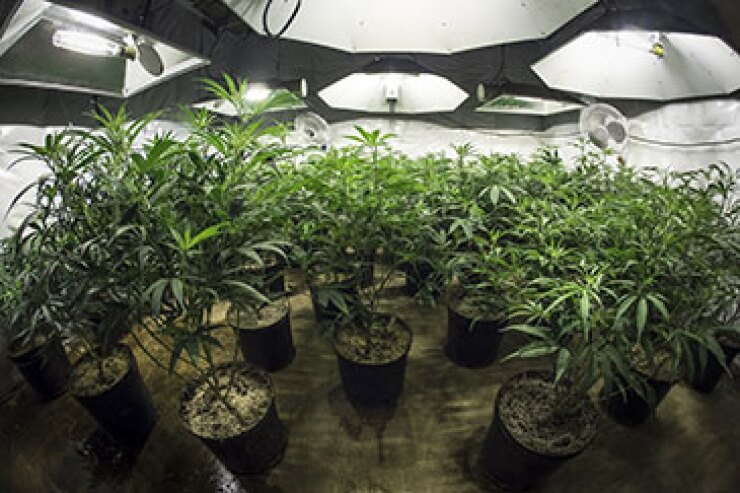
Successful Election Day ballot measures in Massachusetts and Maine to allow recreational marijuana use will provide new, but small revenue streams for the two New England states.
The new Massachusetts law subjects the marijuana sales to the state sales tax and an additional excise tax of 3.75%, with municipalities also having the option to impose a separate tax up to 2%. Revenue from the additional state excise tax or from license application fees will be deposited in a Marijuana Regulation Fund.
In Maine, the state will levy a 10% retail sales tax on marijuana sales on top of its 5.5% sales tax. The first $30 million in tax revenue from marijuana sales is to be used for school construction, with extra revenue earmarked for the general fund.
Massachusetts and Maine joined California and Nevada in approving recreational pot initiatives on Nov. 8.
Colorado, Washington, Alaska, Oregon and Washington D.C. have already legalized marijuana for adult recreational use in recent years. Colorado is on pace to bring in more than $140 million in tax revenue from marijuana this year, according to recent data from the Tax Foundation.
"We are committed to implementing this new law and ensuring it is done in the safest and best way on behalf of all Massachusetts residents," Massachusetts State Treasurer Deborah Goldberg said in a statement. "We intend to work collaboratively with the Legislature and other stakeholders to ensure that this process is professional and fair to everyone concerned."
When asked for revenue estimates from the pot legalization, Massachusetts Office of Administration and Finance spokesman Garrett Quinn said, "we are continuing to evaluate."
A recent report released by the marijuana data and investment firms ArcView Market Research and New Frontier forecasted that legalization in Massachusetts would lead to a revenue boost from an estimated more than $771 million recreational marijuana sales alone by 2020, with $317 million predicted in the first full fiscal year of implementation in 2018.
John Kagia, New Frontier's executive vice president of industry analytics, noted that the revenue estimates do not take into account further economic activity that will be generated from ancillary products, licensing, wholesalers and tourism.
"The activation of this industry generates a tremendous economic opportunity," said Kagia. "It represents potentially important new tax revenue for the state both from the taxation and the sales."
S&P Global Ratings credit analyst David Hitchcock said he never received estimated revenue figures for Massachusetts from marijuana legalization, but noted that $771 million in recreational sales would equate to around $77 million of new revenue in 2020 based on the new taxes. He said that with the Massachusetts operating budget at $42 billion, the new revenue would not make much of a dent to the state from a credit perspective.
"We're talking about a relatively minimal amount," said Hitchcock. "We're not expecting a large impact from this."
Massachusetts Gov. Charles Baker opposed the referendum, but told reporters the day after Election Day he will honor the will of the voters. The new law calls for the state treasurer to set up a Cannabis Control Commission with the governor appointing an advisory panel to it.
"Governor Baker looks forward to working with lawmakers, educators, and public safety and public health professionals to develop a responsible and timely approach that honors the will of the voters while also addressing public safety and health issues in our communities," Baker spokesman Brendan Moss said in a statement.
The press offices for Maine Gov. Paul LePage and State Treasurer Terry Hayes did not respond to requests for comment on when the marijuana legalization will be implemented and how the new revenue will impact state finances.
S&P issued a Nov. 15 report saying that Maine's marijuana legalization will have a modest impact on state revenue growth. S&P analysts Jillian Legnos and Hitchcock said they expect the law to increase gross general fund revenue to roughly $2.8 million in the 2018 fiscal year and $10.7 million annually in subsequent years.
"It's extra incremental revenue, but is not a game-changer," said Hitchcock. "It's not a big amount in the context of a state budget."
S&P noted that more important to Maine from a credit perspective than the marijuana legalization was another Election Day referendum approved that places an additional 3% tax on households with incomes of $200,000, with the new revenue earmarked for public schools.
The state estimates revenues will increase by roughly $142 million in tax year 2017 and by an additional $12 million or more each subsequent year. S&P calculates the increase in tax collections to number around 4.3% of total budgeted fiscal 2017 revenues.
The Arcview and New Frontier research forecasts that Maine will generate $196 million in annual recreational sales by 2020.
Maine Revenue Services reported $23.6 million in dispensary sales in 2015 from medical marijuana, a 40% increase from 2014 dis¬pensary sales and more than triple the 2013 numbers, which Kagia says highlights the strong demand in the state once legalization kicks in.
He added that Maine along with Massachusetts could also benefit from new tourism dollars since they are the first two East Coast states to go the pot legalization route.
"There is an enormous opportunity to incorporate legal cannabis with tourism in both Maine and Massachusetts," said Kagia. "The significance of Massachusetts and Maine being the first two east coast states to legalize cannabis should not be understated."
Fitch Ratings assigned an AA-plus rating to Massachusetts general obligation bonds with a stable outlook on Nov. 9 citing strong budget controls with strong reserves. The Bay State is also rated AA-plus by Fitch Ratings and Aa1 by Moody's Investors Service.
Maine was assigned an Aa2 rating with a stable outlook by Moody's this past May in advance of a $97 million bond sale to finance various capital projects. The Moody's rating cautioned that while the state has "historically stable revenues," the state could get downgrade if its negative unassigned fund balance worsens. S&P rates Maine debt at AA.





